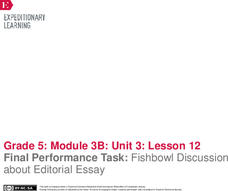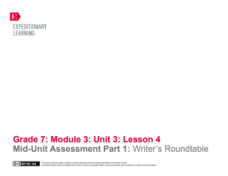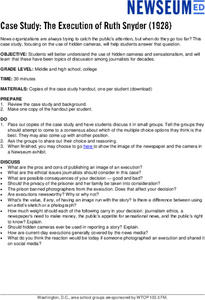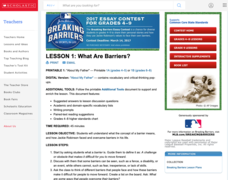Great Books Foundation
Discussion Guide for 1984
George Orwell's Nineteen Eighty-Four, published in 1949, can seem strangely prophetic when compared to modern news events and politics. Readers of Orwell's dystopian classic sharpen their critical thinking skills by engaging in...
EngageNY
Final Performance Task: Fishbowl Discussion about Editorial Essay
Using the resource, learners share their essay revisions with a partner. Afterward, they participate in a Fishbowl discussion, receiving peer feedback about their editorial essays.
Curated OER
Sign of the Beaver: Book Club Discussion
Good question are the heart of great discussions. To prepare for a book club discussion, introduce young readers to the characteristics of good conversation-starting questions. Practice crafting questions for a text the class has...
EngageNY
End of Unit 2 Assessment, Parts 1A and 1B: Fishbowl on Screen Time and Adolescents
Here's a surefire way to ensure that class discussions go swimmingly! Using the resource, scholars participate in a Fishbowl activity, forming two concentric circles in the classroom. As the group on the inside of the fishbowl discusses...
EngageNY
End of Unit Assessment: Fishbowl Discussion
Is it worth it? Scholars complete the end of unit assessment by participating in a fishbowl discussion to consider if the benefits of DDT outweigh the consequences. They reflect on their discussions by completing an exit ticket.
Constitutional Rights Foundation
Conducting a Panel Discussion and Civil Conversation
The final lesson in an 11-session study of immigration asks class members to engage in either a panel discussion or a civil conversation of the controversial legal and policy issues they have investigated as part of the unit.
Anti-Defamation League
The Revealers: Discussion Guide for Grades 6-8
Suspense! Rebellion! Cyberbullying! No wonder Doug Wilhelm's novel The Revealers appeals to middle schoolers. Instructors new to using the novel and experienced veterans will find this discussion guide invaluable. Discussion...
Anti-Defamation League
The Skin I’m In: Discussion Guide for Grades 8 and Up
Words can hurt! But self-esteem can blunt the impact. That's the takeaway when discussing the themes in Sharon G. Flake's powerful novel The Skin I'm In. A discussion guide leads groups through a study of this narrative of a girl...
Curated OER
The Lightning Thief: During Reading Strategy
After reading up to page 371 of Percy Jackson and The Olympians: The Lightning Thief by Rick Riordan, get insight into how Percy felt making a major decision through active discussion strategies that enable both academic...
Teaching Children Philosophy
Tiger-Tiger, is it True?
Scholars take part in a philosophical discussion about truth, thoughts, and feelings following a reading of Tiger-Tiger is it True? by Byron Katie and Hans Wilhelm.
EngageNY
Mid-Unit Assessment Part 1: Writer’s Roundtable
Hear ye, hear ye, it's time for a writer's roundtable! Scholars clarify their thinking about their narrative writing project by engaging in a fishbowl discussion about their plans. As members within the inner circle discuss the topic,...
EngageNY
Mid-Unit 3 Assessments, Part 1: Summarizing, Analyzing and Discussing Research
Speak up and listen up. Scholars participate in a speaking and listening mid-unit oral assessment. They discuss whether their rules to live by should be a personal choice or made into a law, and then they complete an exit ticket to...
Centre for Clinical Interventions
Social Skills Treatment Programme
Even though they may not be tested on standardized assessments, social skills are vital for students to develop during their years in school. Through a series of discussions, activities, and role-playing exercises,...
EngageNY
Mid-Unit 3 Assessments, Part 2: Summarizing, Analyzing and Discussing Research
Why is reading important? As part of the mid-unit assessment, scholars read, summarize, and analyze an article about the importance of reading. Additionally, they continue their discussion about whether their rules to live by should be a...
Great Books Foundation
The Fox and the Stork
Young readers take part in a meaningful discussion following a reading of Aesop's fable "The Fox and the Stork." Five questions focus on the characters' actions and offering apologies.
EngageNY
Mid-Unit Assessment: Small Group Discussion: How Do Modern Poems Portray Modern Adversities?
How is a poem similar to and different from a news article? Pupils use a graphic organizer to compare and contrast the two genres. Also, as part of a mid-unit assessment, scholars participate in small-group discussions based on poetry...
Constitutional Rights Foundation
Special Order 40
The city of Los Angeles' 1979 Special Order 40 states: "LAPD officers shall not initiate police action with the objective of discovering the alien status of a person." After reading a fact sheet that details the history of Special Order...
Robert Frost Farm
Socratic Seminar Format Overview
Whether new to the Socratic seminar format or an experienced veteran of the popular discussion technique, you'll find much to like in a five-page, richly detailed packet that not only details the prep necessary, the process, and the...
EngageNY
Reading about the Author’s Perspective: Why Do Authors Write about Natural Disasters?
It's all about perspective. Scholars view a note from the author in Eight Days. They determine the gist and discuss what they can learn about the author's background based on the note. They then complete a fishbowl activity in...
EngageNY
Using Multiple Resources of Information: Creating a Cascading Consequences Chart about DDT and Practicing a Fishbowl Discussion
For every action there is a consequence. Scholars continue their work on creating a cascading consequence chart about DDT using Welcome Back, The Exterminator, Rachel Carson: Sounding the Alarm on Pollution along...
Newseum
Case Study: The Execution of Ruth Snyder (1928)
The case of the 1928 execution of Ruth Snyder takes center stage in a instructional activity that asks young journalists to consider the ethics involved in publishing an image of an execution. A series of discussion questions ask...
EngageNY
Group Discussions and Revision: Editorial Essay
Great minds think aloud! Pupils participate in the Fishbowl protocol, discussing their opinions about the Mary River mine proposal. As they share their thoughts, peers provide feedback about their thesis and supporting ideas.
Scholastic
Lesson 1: What Are Barriers?
Scholars discuss the concept of a barrier with a short passage on Jackie Robinson. The writing process begins with a paragraph and several other sentences about Robinson's unique traits that made breaking a barrier...
EngageNY
Mid-Unit 3 Assessment, Part 2: Explaining How New Information Connects to the Topic
Let's talk it out. Using the resource, scholars work in triads to discuss how their research has deepened their understanding about sustainable fishing. Next, pupils engage in a whole-class discussion to consider their next steps toward...
Other popular searches
- Book Discussion Groups
- Literature Discussion Groups
- On Line Discussion Groups
- Online Discussion Groups
- Novel Discussion Groups
- Threaded Discussion Groups
- Group Time Discussion























